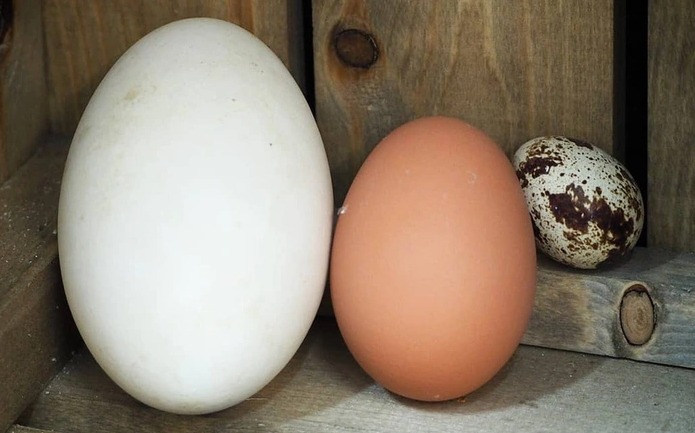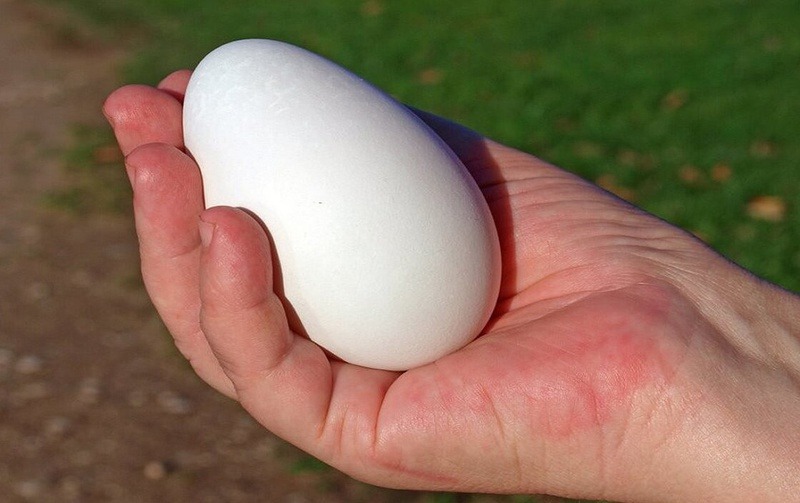Nutritional Value of Goose Eggs
Eggs are a rich source of nutrients, high in protein, vitamin A, calcium, iron, and other nutrients, capable of supplementing the body with nutrients and boosting the immune system. Among poultry such as chicken, duck, and goose, chicken and duck eggs are usually more popular, while goose eggs are less noticed. The rarity of goose eggs is not only seen in family meals but also in the market.

Although people often consume goose meat through popular dishes such as stewed or roasted goose, which are famous for their special aroma and taste, goose eggs are less preferred. This raises the question: why do few people like to eat goose eggs? Is it because they are not as delicious as goose meat?
There are several reasons why few people prefer to eat goose eggs:
Low Quantity of Goose Eggs
In rural areas, families usually raise only one goose due to the high cost and laying cycle of its eggs. With a long laying cycle and a limited quantity of eggs, goose eggs become scarce.

High Price
Compared to chicken and duck eggs, the price of goose eggs is usually significantly higher. The scarcity and the cost of raising geese increase the value of the eggs, causing many people to choose other types of eggs.
Strong Odor
Goose eggs often have a strong and unpleasant odor, which is hard to accept for many people. This strong odor can reduce the appeal of eggs when choosing food.
Size and Inconvenience in Eating
Goose eggs are larger and have thicker shells compared to chicken and duck eggs. The shells of goose eggs are also quite dirty and need thorough cleaning before consumption. The size and thick shells make the use of goose eggs inconvenient.
No Higher Nutritional Value
Contrary to popular belief, the nutritional value of goose eggs is not higher than that of chicken or duck eggs. The protein content in goose eggs is lower than that in chicken eggs, and the fat content is higher compared to both types of eggs.
Delicious Cooking Ideas for Goose Eggs
Fried Goose Eggs:
Ingredients:
- Goose eggs
- Spring onion
- Minced garlic
- Oyster sauce
- Salt
- Vegtable oil
Instructions:
-
Chop the spring onion into small pieces and finely mince the garlic. Crack the goose eggs into a bowl, using one egg for each dish. Season with salt according to taste and beat evenly with chopsticks. In a pot, pour an appropriate amount of oil and heat it up to around 80%. Then, pour the goose eggs into the pot and fry them over high heat until they turn golden and puffed up into large pieces.
-
Fry the goose eggs on high heat until they turn golden, then add the chopped spring onion and minced garlic to stir-fry until fragrant. Next, add oyster sauce according to taste and stir-fry evenly. Finally, enjoy the delicious dish.
Steamed Goose Eggs:
Ingredients:
- Goose eggs
- Warm water
- Soy sauce
- Sesame oil
Instructions:
-
Clean the goose eggs thoroughly and crack them into a bowl. Season with salt according to taste and beat evenly with chopsticks. Then, pour warm water into the bowl and stir well, using a spoon to remove the foam, pour the mixture into a large dish.
-
Cover with plastic wrap and use a toothpick to poke several small holes. Boil water in a pot and place the dish of goose eggs for steaming over high heat for about 10 minutes. Then, remove it and add light soy sauce and sesame oil, finally enjoy.
Although goose eggs provide some nutrients such as protein, lecithin, fat, vitamin A, calcium, and iron, this value is not enough to make goose eggs popular. For many people, chicken and duck eggs are still the preferred and convenient choice.





































